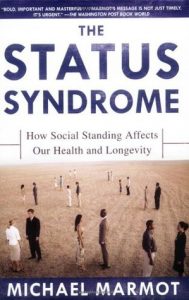
Any book or idea that is statistically oriented — barring the book on statistics per se — should be taken with a truckload of skepticism; however, the fact that this book falls in the mediocristan radar of statistics made my read like a walk through boulevards. The author in this book made a salubrious effect in exposing the health gradient seen in the society — the higher the status in the pecking order the healthier people are likely to be: which is what author calls status syndrome. Michael Marmot, in his dialectic and syllogistic approach — lays bare — no holds barred — how one’s social standing in society affects health adversely or favorably. For a given biological agent and cause, the author soberly writes, the people in the lower strata are more likely to be affected. This cannot be mistaken for lack of money or other facilities. In fact, the author trenchantly says that when the problems of privation have been solved, how much money you have is not as important as how much you are relative to others in society. More emphatically, what characterizes being poor and lower in the hierarchy is a great sense of helplessness — lack of control over life circumstances. The author ominously adds that poverty is more than a lack of money, it is more of circumstances we live. The line from John Kenneth: who can say for sure that the deprivation which afflicts him with hunger is more painful than the deprivation which afflicts him with the envy of his neighbors car — is as gravely a concern as it appears sardonic. It is this sense of helplessness, this lack of control that affects one’s biological stress pathways.
What separates one from another in the pecking order, according to the author, are the control, predictability, degree of support, threat to status. These factors modulate the impact of psychologically threatening stimulus — and all of them likely to be linked with social hierarchy. While the point the authors makes drives home already, my view on the observed support from the bottom-up social hierarchy directly follows from my favorite line by Lyndon Johnson: it is no longer easy to get the help you need when you are no longer on the top of the world (here replace the world with social hierarchy). This support one relishes in the comportment of a fawning man indulging in the excess of hobnobbing. To conclude — each of us has several roles, whether as a parent, partner, child, employer, employee, resident, citizen, opinion former, etc.; and whatever roles we assume has an important influence on our own opportunities for self-realization, or autonomy and social-participation. These are not just pleasant things to have, but also immensely affects health if thwarted. The fact we systematically thwart these for people lower in the hierarchy is a massive blot on a civilized society.
“Your chances of being in a favorable or unfavorable situation in adulthood will have much to do with what happened to them earlier in life: security of attachment, pre-school environment, schooling, the neighborhoods in which they grew up, opportunities for higher education, quite apart from the genetic endowment.”
Started reading “status syndrome” by @MichaelMarmot.
— K. Satyanarayana 🇸 (@satyakatla) June 21, 2019
Is the book predicated on statistically oriented science, if so, does it fall in mediocristan or extremistan? @nntaleb. Let’s explore. pic.twitter.com/mAJQgvS6jn